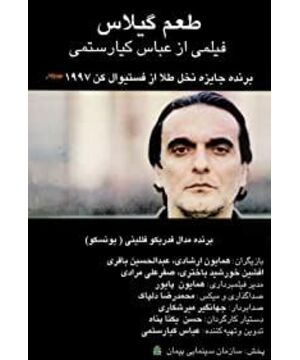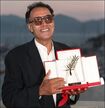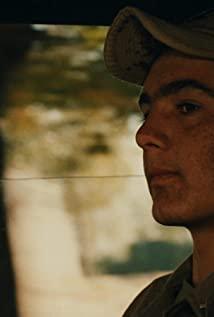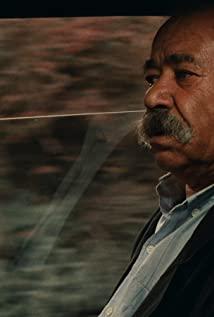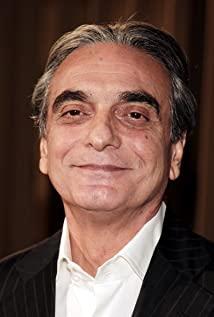From Abbas' penultimate work: Nietzsche-inspired Reproduction, shot in Tuscany, Italy, to Like A River in Love, which is often stylistically reminiscent of Yasushi Ozu Erlang or Jim Jarmusch. Including his unfinished project: "Love in Hangzhou", what Abbas presented had already ended the inevitable connection with Iran.
If the "Village Trilogy" seals the traditional way of life in the Iranian (Persian) countryside with a Russian nesting doll-like magical realism meta-narrative, and "Close-Up" responds to the class status quo in Iran with a documentary-feature film gaze, then, since From "The Taste of Cherry", this "Iran" begins to end, until it breaks.
(1) "Only Islam"?
First of all, let's clarify "culture". "Culture" is different from "civilization". "Culture" is the product of interaction. On the one hand, this effect comes from the effect of its space, and on the other hand, it is the "other" in time and civilization. ". Therefore, culture is "becoming" on the one hand (like Deleuze's sugar cup), and on the other hand, it comes from the repeated given of "civilization".
Of course, the above arguments come from the same premise, which is to regard what has been developed by “culture” from hundreds to thousands of years as a fixed subject, and to make an exclusive simplification on the basis of the subject— - Ignore the "minor details" that may cause contradictions, otherwise, "civilization" may also be continuously generated, just as oil may also be a renewable resource.
Most of the time and within life experience, "culture" merges with the "space" in which it resides, otherwise a new "other" will emerge. But through the movie, we may find its suspension phenomenon.
Ang Lee's "The Wedding Banquet" is an example: in the last wedding banquet, which was self-deprecated as "five thousand years of sexual repression," the spatially US gave way to "China" as an "invader" (although this The move may be argued to be political, but not a specific "People's Republic of China" or "Republic of China", just "China"). Or rather, since the end of its first act: the passenger plane that symbolizes the intervention of the "patriarchy" appears on the screen, a bridge of sound, the cultural "America" separated from the spatial "America", and the cultural "America". "China" is suspended. Audio-visually, it hints at this.
The United States in The Wedding Banquet is where it is and at the same time it is not.
Similarly, "Iran" in space may be the same as "Iran" in culture (actually, the definition of "Iran" here is not as simple as the definition of "China" and "America" in "The Wedding Banquet". The "Persia" that worships Zoroastrianism, on the other hand, is Iran in the Islamic cultural sense, or "Arab"). Before "Reproduction", Abbas belonged to the Iran of space, but the "Iran" in space was provided For a purely metaphysical, non-Iranian space.
After the Islamic Revolution in 1979, after Reza Pahlavi and his family were "permanently on vacation", after Khomeini put forward the slogan "No East, no West, just Islam", Iran on the one hand strictly censored films and banned any Elements that conform to the content of the Sharia appear on the screen, and on the other hand, the Farabi Foundation was established to provide assistance for the filming of the film.
The director of the "Iranian New Wave" was silent for a certain period of time.
Once the founder Darius Mehzuy has turned to a rather "mainstream" field, 2012's "Feng Shui Big Winner" can not but be regarded as a rough imitation of Hollywood plus an Iranian theme education work, with ideology Color, style is inevitably middle-class comedy—like the genre preferred by most developing-country audiences.
Contrary to Mawson Makmabaf's focus on Iranian folklore in some of his films, Asghar Farhadi represents a concern for the state of Iran whose language is more evocative. European social directors such as Christian Mongi or Andrei Sarkinsev, in last year's production "The Salesman," the text of the American drama: "Death of a Salesman" may be borrowed to interact with Iranian social realities. Arts. (Of course, it seems debatable to comment on a living director who has not yet finished his creative career, not to mention that his next work was shot entirely in Spain, with an entirely European lineup, called "Everyone Knows")
"Realism" can also be used to comment on Abbas's film style, but it is neither Bazin's phenomenological realism nor Antonio Nis' "psychological realism", commenting that Abbas should introduce a new The term - "spiritual realism" is in a sense similar to what Kracauer calls "the captured reality", in which the censorship on behalf of the "political" side loses its validity.
(2) The gradual disappearance of the "father" image
We can regard the structure of "The Taste of Cherry" as a very "Persian" (or "Arab", such a combination of "action elements" probably exists in the myths and legends of China, West Asia, and India):
Once upon a time, when the two empires were at war, a nobleman drove his horse away from the royal city and traveled through the countryside. He wanted to hang himself to death. Before he died, he sought out someone to conspire to cover up his corpse. Later, an old man agreed to assist in this way, but with He told about the fruit of cherries (or mulberries), and an animal he had never heard of, the quail...
The above is a rewriting of this story in a mythological way. Then, at the end of a general myth, the identity of the old man may be expressed explicitly—a wise man, or the incarnation of a prophet.
However, the reason why the above is "logical" lies in the first sentence: "Once upon a time, when the two empires were at war", in literal thinking, this may be a background, or even a "useful", that can explain "motivation" ” background, it can be adapted into, that is, the “plot” generated by the “story” composed of words in the reader’s mind is:
Once upon a time, (because) the two empires were at war, (so) a nobleman drove away from the royal city on horseback.... wanted to hang himself............
But Abbas rejects these in the film, which is why it is "non-Iranian".
Iranian symbols of the present and "just past" may appear in the film, and even appear everywhere, such as Badieyi's middle-class identity, his Land Rover may be from the Pahlavi period, and the previous text argues " War” (the Afghan war), can only exist in his words when he takes a passenger (or the audience’s common sense about Iran’s surroundings during this period), and it is fleeting.
Abbas once accused film critics of over-interpreting a certain scene in "Close-Up". However, analysis of Abbas' films is still necessary, but the focus needs to be changed from "What does Abbas want to show?" to " What does Abbas show?" The latter contains a series of unintentional and unconscious elements.
It is worth pondering on two metaphorical shots:
One is that Badieyi drove to a construction site and was greeted by two children playing with old trucks. The "car" here is deconstructed for its own purpose, which is equivalent to Iran and "Persia" in Abbas's works. status. "Hometown" is an eternal motif in third country films: in "The Wedding Banquet" it may be a shadow of a father that must be confronted, symbolizing actual power, while Shuji Terayama's "Pastoral Ritual of the Dead" It is a jigsaw puzzle in which "I" is re-personalized after re-dialogue with childhood experiences by going back to "hometown".
However, for Abbas (rather than "Iran's Abbas") remnants of the Pahlavi period, Khomeini's ghost, and even "emerging" Tehran regress to a similar framework, in " The "father" sealed in "The Village Trilogy" fades away in "The Taste of Cherry".
The second is instead the beginning of the film: the moment when Badieyi drives out of the city, it is treated as if it were a "ceremony", or a "purification", while Badieyi leaves the city and then Several social relationships are constructed within this small space inside the car. The Iranian countryside is like a metaphor, a denial—a pure allegory that triggers the juxtaposition of binary relationships.
Badieyi may have "suddenly descended", and "The Taste of Cherry" may also be a meta-narrative, an infinite loop, so the discussion about whether Badieyi committed suicide is meaningless, a movie is equivalent to In a program that runs for 94 minutes, Badieyi only exists within 94 minutes of "real existence", from nothing to nothing, not even fading in and out, just a black screen, and then a few lines of earthworm-like text.
(3) A politicized interpretation
If Land Rover symbolizes the remains of the Pahlavi period, then Badieyi may belong to the Pahlavi period, a middle class of that period, a former nobleman, a seeker, not a complicit in seeking suicide— -Suicide, may be just a cover to cover up the real behavior, what he is really looking for is a repetition, the repetition of the Pahlavi period because of the unease brought about by the present, and at the end, the experience of repetition is only being falsified Instead, it proves its "possibility", or "existence"
What might he have found from the landscape in "Being"? The future of Iran and Iranian cinema? In the harsh environment of the rebels (specifically refer to Jafar Panasi, who was convicted for the filming of "Taxi"), this society still has vitality.
These tones seem to be commenting on the Sanskrit chanting at the end of Luo Dayou's song "Queen's Road East". If "politics" is regarded as the first and everything, then interpreting "The Taste of Cherry" as "Queen's Road East" is also Nothing wrong.
(4) A Camusian Interpretation
Badieil is an absurd hero, an "outsider" whose "self-departure" at the beginning signifies his self-imposed exile, the Iranian countryside may take on the role of Algeria in Camus's work, and the long journey is not only physical. The extension in the heart is the extension in Badieyi's heart.
What he drives away (or "needs to face") is the ineffective "modernity" context of all that is inherent, where the religion that once had the say can no longer solve everything - if you assume, as many do, that it can , it can only be explained that it is self-deception. In "The Myth of Sisyphus", Camus called it "philosophical suicide".
Under this interpretation, what role does the cherry tree play? As a result, it withered, like the giant stone of Sisyphus, a metaphor of "eternity" that is constantly reincarnated. At the same time, "eternity" witnesses the existence of itself and its own resistance, so the content returns to the "eternal" mentioned in the previous chapter. Rebellion", "Because there is resistance, so I should live" is equivalent to "I resist, so I exist." It's just that metaphysical resistance replaces the physical resistance of the previous chapter, and the constant reincarnation may also resist eternity.
(5) Abbas' space experiment
Of course, Abbas, who was a poet and an artist, did not simply organize and record images. He should consider "space" as a role in his films, and together constitute film elements, which is similar to Antonioni.
As early as in "The Lover Under the Olive Tree", the tortuous dirt road in the Iranian countryside can be used as the depth of the emotional dimension between the hero and heroine, or it exists before the emotional dimension in the film, because it is incorporated into the frame of the scene. Intention, so, the two appeared.
While in Reproduction, the push-pull and more other types of moving shots are used in Juliette Binoche and William Himmel traversing the narrow lanes of Tuscany, and in Abbas In works of the Iranian period, such shots are rarely used, they are specially designed for space, like in "Reproduction", there is no "Taste of Cherry" or "Gone With the Wind" type of big vistas.
Both "Replica" and "Like a River of Love", including the unfinished "Love in Hangzhou", may be an experiment, as previously done in the Iranian countryside, they explore arbitrary spaces outside Iran (also It may be the futuristic style of Iran, and Abbas's "time" in the experiment of space cannot be ignored. "Like a Love" may be more sci-fi, and Abbas may have found something in the streets of Tokyo) to create a narrative. possibility.
Therefore, "Princess Schilling" is still an epic film. The epicness comes from the construction of several faces - the composition of the projected space of the image. In addition, the faces of women (including foreign women - the addition of Juliette Binoche) bring It has a mildly radical undertone.
In Abbas's works, it is not only "meta-narrative", but also "meta-space".
(6) Welcome to Beckett's Theatre of the Absurd
The car is an important symbol in Abbas's works. First of all, its characteristic is "flow", just like "The Taste of Cherry" is regarded as "flowing search", and "Like a River of Love" is regarded as "flowing Platonic affection" ", Abbas said that his works are more related to poetry than novels. "Car" is like the "space" of the keyboard, which constitutes the rhyme of Abbas' poems.
Secondly, looking at the interior beyond the structure of the film, according to Merleau Ponty's body-subject theory, Badieille himself can be seen as a subject, an incarnated consciousness, which is modernity (if a little more political can be regarded as a standard product of capitalist society), acting on its body-expansion of desire.
The car not only extends Badieyi's conscious "flow" desire, which is manipulated by the conscious and the unconscious, the "seeking" desire between the conscious and the unconscious, but also extends its unconscious desire, the "unconscious" desire. "desire" is his self-imprisonment, it is indeed a space for dialogue, and everyone can be its subjective projection, in short, he is a self-talker, a raving talker.
In this way, "The Taste of Cherry" is a more pessimistic film, which rejects the "salvation" of traditional religion and the metaphysical and sublime resistance. Like Beckett's "Absurdist Play". Although "absurd" has its existential meaning, it no longer represents the meaning of Camus in Chapter 4, but the alienation and dissociation from life. Then, overturning the previous hypothetical argument, it is equivalent to a standard Beckett situation:
Badieyi is imprisoned in a self-designed "cage", and everything he faces can only be an existing "now", he exists in "this time", and exists in "94 minutes"; There can be no action, all "action" can only be the mechanical act of turning the steering wheel, looping back and forth in the repeating landscape outside the window, gazing unconsciously at the same landscape.
After that, nothing happened.
references:
Abbas Kiarostami, The Taste of Cherry: Abbas on Film, Beijing, CITIC Publishing Group, 1st edition, September 2017
Alain Rob-Grillet, For a New Novel, Changsha, Hunan Literature and Art Publishing House, 1st edition, May 2011
Albert Camus, The Myth of Sisyphus, Shanghai, Shanghai Translation Publishing House, 1st edition, August 2013
View more about Taste of Cherry reviews


